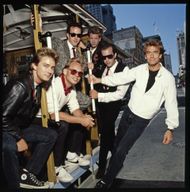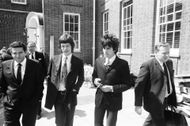The Rolling Stones started out as blues fans from London trying to make music and find food long before they became rock 'n' roll icons. Their story began on July 12, 1962, when they played at London's Marquee Jazz Club, then called the Rollin' Stones. Keith Richards wrote in his book Life that they even had to borrow cash from Mick Jagger's dad to rent equipment for that first show.
At the time, they played songs by American blues greats like Muddy Waters and Bo Diddley, not knowing they'd become famous one day. Now, over sixty years later, with tons of hit songs, the Rolling Stones are still a big deal in music. The Rolling Stones' 2022 tour in Europe, their first without their longtime drummer Charlie Watts, showed how tough they are and how much their fans love them.
Because of their huge impact and non-stop creativity, we've looked back and ranked the ten best Rolling Stones songs ever, which was hard to do, given how much they've changed rock music.
Picking the Rolling Stones' top songs isn't simple, but some tracks stick out. They're not just popular—they shaped who the Stones are and left their mark on music. Songs like Gimme Shelter, with its threatening swagger, and I Can't Get No Satisfaction, with its angry defiance, show how the band grew.
They went from blues cover artists to rock's longest-lasting troublemakers. Sympathy for the Devil and Paint It Black pushed the limits in words and sound. These songs echoed the chaos of their time while changing what rock could be. Fans love these tracks, but they are more than that.
They are key moments that changed culture and proved The Rolling Stones weren't just hit-makers. Instead, they built a sound that still speaks to people today, many years later. These songs stand out not just for how well they did on the charts but also for the care and bold style used to make them. The guitar part in Jumpin' Jack Flash changed the way people think about rhythm guitar in rock music.
The deep background singing and mix of sounds in You Can't Always Get What You Want showed that the band was open to trying new things beyond the usual rock set-up. At the same time, Wild Horses showed a soft side under their tough look, proving they could touch on deep feelings without giving up their sharp edge.
Each song marks a key change in how they were made, what they said, or how they fit into the world, which made the Rolling Stones not just great showmen but also true path-makers.
Disclaimer: This article contains the writer's opinion. Reader discretion is advised!
Here are the top 8 The Rolling Stone songs of all time
Here are the top 8 songs by The Rolling Stones, not just picked for their chart hits or how much they played on the radio, but for how they have lasted, changed music, and made a mark on culture. These songs show the band at its best, packed with years of fierce power, bold acts, and a lot of new art.
From the loud start of Gimme Shelter to the sad tune of Angie, each song here has made its mark, shaping not just the band's sound but whole times of rock music. This list shows the times when the band went beyond the norm, making songs that were new, brave, and for all time.
1) Angie (1973)
Moving away from The Rolling Stones' signature cocky style, Angie showed up as a soft, piano-driven love song on their 1973 album Goats Head Soup, revealing a more open and raw side of the band. The song's delicate string setup and bare-bones music create a rare quiet moment, showing Mick Jagger as a tired lover thinking about a love that's gone but still fought for.

His singing carries the weight of being drained in the song's most unforgettable request: "Angie, you're beautiful, yeah / But ain't it time we said goodbye?" It's worth noting that despite many fan guesses linking the song's name to Keith Richards' baby girl Angela, Richards later cleared things up in his 2010 life story.
He explained that the name had no planned link. He wrote the song while getting better in a rehab place, and the title was just a stand-in at first, one that just stuck around and ended up staying for good.
Read More: Top 6 Leonard Cohen songs of all time
2) Brown Sugar (1971)
Brown Sugar, the fiery opener of Sticky Fingers (1971), stands as one of The Rolling Stones' most daring works, in both music and lyrics. With Keith Richards' sharp guitar riffs and Mick Jagger's bold vocals, the song captures the raw power the band had perfected but wraps it in imagery that's grown more disputed over time.
Touching on slavery, drugs, race, and intimacy in one explosive mix, the track's words have sparked years of talk about who inspired it, either Marsha Hunt, who had Jagger's first child, or Claudia Lennear, a backup singer and his rumored love during recording. In recent times, the Rolling Stones chose to cut the song from live shows after new questions about its themes, though Lennear herself felt let down by this move, asking for a deeper look at art in its historical setting.

While its sister track, Wild Horses, flows like a country ballad, Brown Sugar rushes ahead with a drive that shows the Stones' dive into the wild excess of the 1970s. Jagger once said the lyrics were meant to be chaotic, a mix of taboo topics that felt risky enough to fuel a rock anthem.
Years later, Brown Sugar still stirs up strong feelings, praised for its riff-driven brilliance and slammed for its reckless words, making listeners face the tough spot where art, history, and debate clash.
Read More: Top 7 P!NK songs that defined her career
3) You Can't Always Get What You Want (1969)
There's just something really human about the way music can make sense of our most complicated emotions. It's the self-help stuff that makes a big difference, but sometimes just a melody or line says it all, even before you realize it spoke straight to your heart.
Some people find this same thing with Get What You Want, which ends their 1969 album Let It Bleed and has become kind of an anthem for going on with life when things don’t go your way. Instead of trying to show a way of accepting things, with a sadness but also with a strength at the same time, which gives it a surprise touch, mixed in with the strong voices of the London Bach Choir, they put together a great song into something that feels like everybody’s together in it.
Sometimes when you listen, it seems like the song just makes peace with the things that life hands you, instead of complaining, and this has fans singing the chorus together, sometimes making Mick Jagger himself hard to hear, and it feels like everyone needs to let it all out together.
More than just a song or a moment, it feels honest, like a little ritual people do together, reminding you to not just get what you want, maybe you'll get what you actually need.
Read More: 10 times Rihanna dominated the stage like a true queen
4) Beast of Burden (1978)
When The Rolling Stones dropped Some Girls in 1978, they weren't just coasting on their '60s attitude; they were changing their sound to keep up with the times. Beast of Burden, a standout song on the album, showed how they handled the new music scene.

Instead of jumping on the disco bandwagon that would shape their early '80s music, the track mixed rough edges with smooth touches, powered by Keith Richards and Ronnie Wood's guitar teamwork. Their intertwined riffs didn't just echo the past; they gave the Stones a new identity for the '80s.
This wasn't about starting over but about showing they still had it: proof that the band could still create great music even as Richards fought addiction and the industry braced for big changes. Beast of Burden didn't follow trends; it stood firm, sounding fresh but Rolling Stones-like, showing a band on the brink of change without losing what made them special.
Read More: Top 7 Queen Latifah songs that showcase her iconic versatility
5) Wild Horses (1971)
Coming out of Muscle Shoals Sound Studio in Alabama at the end of the 1960s, Wild Horses shows a side of The Rolling Stones we don't often see—quiet and thoughtful. Instead of their usual loud and confident sound, this song moves like someone talking about past mistakes and gentle feelings. Keith Richards started writing it for his newborn son, trying to express how much he missed him and loved him while he was away on tour.

But by the time it ended up on their Sticky Fingers album in 1971, Mick Jagger had changed it. Now it was about a relationship falling apart, about how hard it is to stay close to someone, and about accepting that things change. Over the years, Wild Horses has come to mean different things to different people.
Some think it's asking someone to stay loyal; others see it as a song about getting through a broken heart or trying to hold onto your youth as it slips away. No matter how you look at it, though, it's a song full of longing. It stands out as one of the times when the Rolling Stones opened up and showed their softer side.
Read More: The top 7 most covered songs in music history
6) Paint It, Black (1966)
When Aftermath came to U.S. stores in 1966, it started with Paint It, Black, a song that did not start slow but flung you into a storm of loud drums and a sitar-mixed guitar sound. The mix of Eastern music and the Rolling Stones' bold rock style gave the track a dreamlike feel, both drawing you in and shocking you.
More than just sharing a sad tale, Mick Jagger's voice had a wild rush, taking the song into darker, stranger places. Often seen as a cry from a sad place, the song's wild hints and messy power moved it past just sadness, catching a wider feel of deep unrest. It wasn’t only the first song, but it was a bright sign for a new, dark style of the Rolling Stones.
Read More: The legacy of Led Zeppelin: A journey through rock history
7) Gimme Shelter (1969)
The opening seconds of Gimme Shelter don't just start a song; they bring a storm. The Rolling Stones put it out on their 1969 album Let It Bleed. It kicks off with an eerie guitar riff that seems far away yet pressing, setting up a track full of fear and lost hope. People often see it as a reflection of the violence and turmoil during the Vietnam period, but Keith Richards says he got the idea from something as simple as watching folks run from a sudden downpour.

That everyday scene turned into a song with end-of-the-world vibes, its words hinting at war, rape, and death as constant threats. Merry Clayton's powerful vocal guest spot changes those ideas into a soul-stirring shout, raising the song's emotional impact.
The 1970 Maysles brothers' film Gimme Shelter later made it famous. The movie showed the deadly chaos at the Altamont Free Concert, and the song has grown to stand for the grim breakdown of the 1960s' bright-eyed idealism.
Read More: Top 8 The Doors songs of all time
8) (I Can't Get No) Satisfaction (1965)
The Rolling Stones reached a milestone with (I Can't Get No) Satisfaction in 1965. This song changed their musical direction and had a cultural impact. Keith Richards came up with the rough, distorted guitar riff in a dream. Mick Jagger wrote lyrics that aimed at consumerism and media overload. These elements caught the mood of growing discontent at the time.
Jagger penned the words while in Florida, annoyed by what he saw as America's shallow excess. This feeling connected with young fans. The track became the band's first U.S. number one hit. It appeared on their album Out of Our Heads.
This song didn't just make the Rolling Stones popular—it made them legends. Even now, decades later, Satisfaction plays at parties, in bars, and at big venues. It shows how one song can capture a generation's frustration and still feel relevant today.
Read More: 8 iconic Chester Bennington songs that define his legacy
The Rolling Stones' song list shows their long run, change, and mark on rock music. For over six decades, their works show the changing ways of culture, fight, and craft, from their early raw blues sound to the bold sound of Sticky Fingers, the tough feel of Exile on Main St., and the deep tones of their newer songs.
Each time in their list shows a band not scared to change, try new things, and face the times they lived in. More than just a rock band, the Rolling Stones are now big cultural symbols, and their song list is both music for many ages and a record of how rock keeps changing.
Keep reading SoapCentral for more informative content!
Also Read: 8 greatest Aerosmith songs of all time
